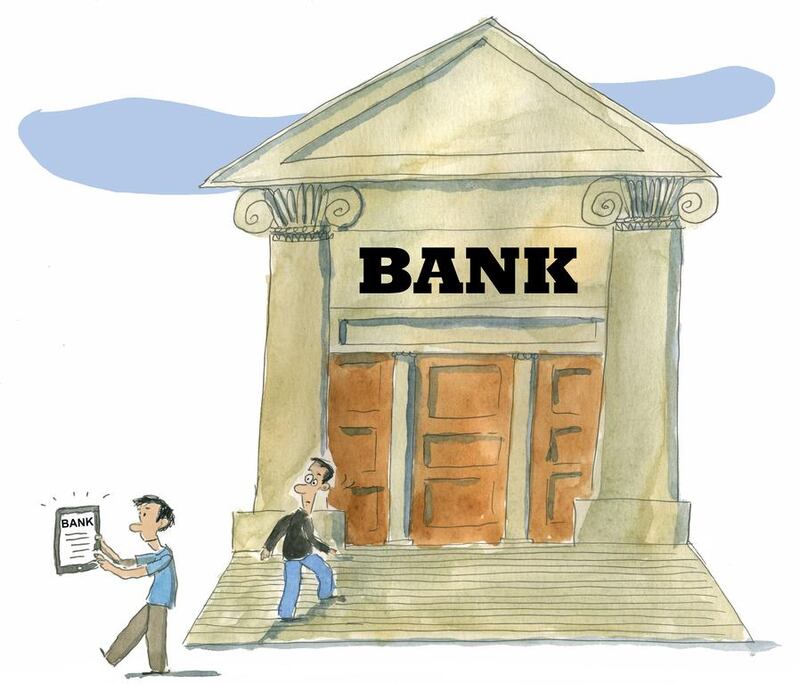When it was time for a question-and-answer session after a talk given by the chief executive of a local bank here in the UAE, one bright spark asked whether those running banks were concerned about disruptive technology and ideas eating away at their market share.
Of course the reply was a bland, standard public relations spiel that essentially said nothing.
Often, it's not the answer that counts, but the question being put out there.
Let us not talk about whether the laws of the land would permit a truly disruptive bank to exist - or what IT giants such as Apple, PayPal or Google are already doing in this space. Instead, let us ponder how it could be possible that the very people who are the banking system - especially middle management - could allow anything disruptive when they are the very epitome of conformity.
And so it is with great interest that I observe banks based in the UAE racing to embrace all things digital. Facebook virtual banking, personal finance management platforms, digital branches and remote video banking are examples of what's being proffered. But I've got news for you. It won't be so much a revolution as a revolt that will happen if the same practices and attitudes that we endure in day-to-day banking here remain.
The big spanner in the works is the people signing things off, coupled with the existing structure (read confines) of the traditional bricks and mortar approach, mentality, restrictions, interpretation of compliance, and way of conducting business here. All conspire to make it impossible to truly benefit from what technology has to offer, and go disruptively digital. Or should that be digitally disruptive. It doesn't matter because neither will be allowed to exist.
What appears to be on offer is providing what is traditionally available, digitally. In which case I would suggest forgetting about it - for now - and instead spend the money on training staff within existing structures to make our interactions with them, and the bank, less stressful, more helpful, and in keeping with what we need. Or at least making sure that we get the same (correct and up to date) information from every person at the bank when asking questions (I recently had five people each give me a different answer to the same query within the space of a couple of hours). Or all that will transpire is that we are left with newer ways of dealing with old problems.
Banking is a must, but banks aren't. This is why global investment in financial technology ventures was nearly US$3 trillion in 2013, according to a study by Accenture. That's more than triple the spending in 2008.
Elsewhere, banking has evolved. For example, retailers are offering chequing accounts in some places. The head of one bank's response to this was that retail companies should stick to what they know. Well, if what they know is how to serve customer needs, then they are ahead of the banking pack. In the United States, another survey states that 43 per cent of people questioned said their bank did not understand their needs - and dare I say that their needs are probably being better served than ours in the UAE.
Finding out whether our needs will really be addressed is one reason I'm looking forward to Atom's launch this year. It's the UK's first mobile and only online bank, having recently won a banking licence to operate in the UK. All it is an app. No website, no branches, nothing.
Its inspiration does not come from banks. So far so reasonable.
Plus its top management is a roll call for the who's who in first movers who shook up the UK's banking industry - including the co-founder of Metro Bank - the UK's first bank in 150 years when it launched in 2010, and the former head of telephone banking at First Direct.
This is what Atom's chief operating and innovation officer had to say about what it is doing: "We've set about designing a banking app that's in tune with how people think about their money. Our customer service team will provide support and technical expertise to customers all day and every day by phone, chat and email and through social media."
All day every day. The team will be available when people need them, not when people are busy earning a living to pay bills and loans. It will be a long time before we can bypass banks 100 per cent - even Atom needs partnerships with traditional banks for its ATMs. But when survival is due to protectionist policy, then the banks' days are numbered, even if they do control payment systems. For now though, the heads of banks know that they can get away with non-answers.
Nima Abu Wardeh is the founder of the personal finance website cashy.me. You can reach her at nima@cashy.me.
Technology has the answers in banking
Banking is a must, but banks are not. This is why global investment in financial technology ventures was nearly US$3 trillion in 2013, according to a study by Accenture.

Editor's picks
More from the national




